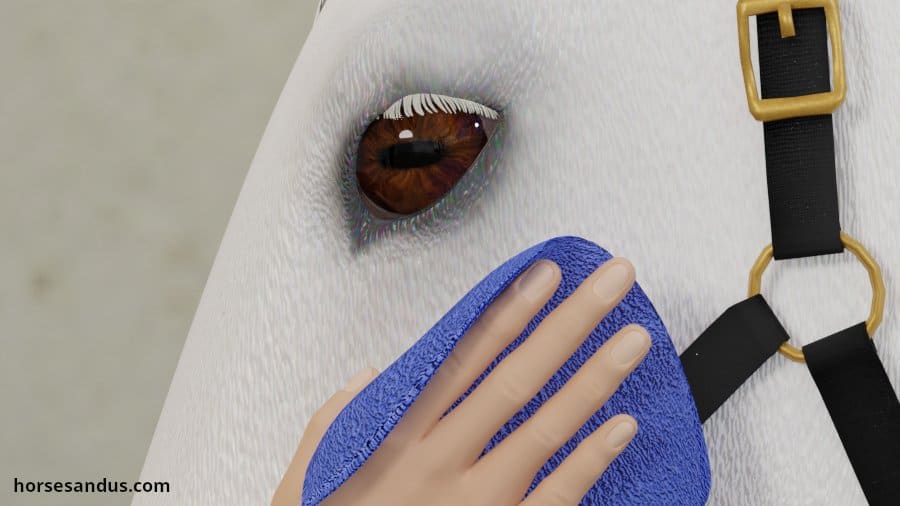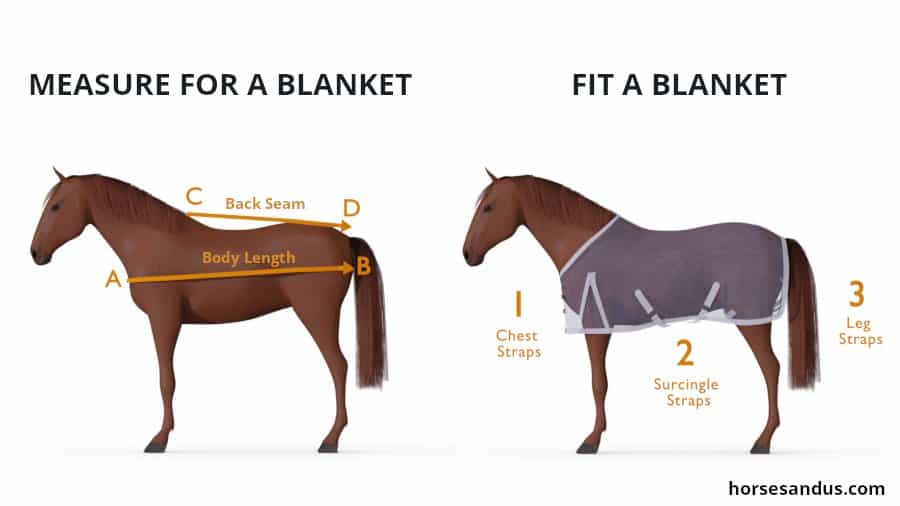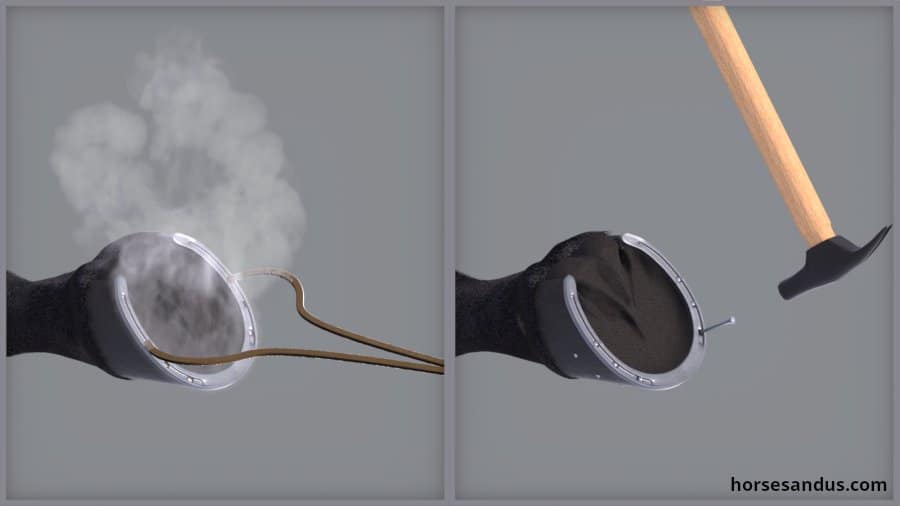This question does not have a straightforward answer because the daily water requirement depends on many factors.
An average-sized horse (1,100lb / 500kg) with a limited activity level and living in a moderate climate, will drink approximately 5 to 10 gallons (20 to 40 liters) of water a day.
However, the amount of water horses drink will vary considerably depending on several factors.
But ultimately, what matters is that the body’s water balance is maintained.

The amount of water intake (fluids, food, metabolism) that a horse needs is determined by the amount of water he loses (feces, urine, sweat, and milk in lactating mares).
This article will go in-depth on the 7 factors that influence how much water a horse needs a day.
1. Body Weight
Most of the horse’s body is composed of water, around an average of 70% (In foals, this percentage is even higher, around 80%). So under the same conditions, the bigger the horse, the higher the quantity of water he needs to drink.
There is an old rule of thumb that horse people often use: 1 gallon (4 lt) for every 100 pounds (45 kg) of body weight.
Also, a fat horse will usually need less water than a horse with a good body condition with more muscle. This is because fat has less water content when compared to lean muscle.
So considering that 70% of the body weight is water, an average-sized horse 1100 pound (500kg ) will contain 92 gallons (350 lt) of water.
Water is Distributed Through Different Fluid Compartments
This water is distributed across different fluid compartments, as shown in the image below, with estimated values for an 1100 pound (500kg) horse.

Source: https://veteriankey.com/water/
A horse can have up to 16 gallons (60 liters) of water within the large intestine. This reservoir of water is drawn upon during heavy exercise. A High fiber diet will increase this reservoir’s size, which is very beneficial for horses with intense activity.
2. Diet
The horse’s water intake is not only done by drinking fluids. A fair amount of water intake is done through food, which also contains some water.
This means that the diet determines how much water the horse needs to drink to make up the total daily water requirements.
More Water is Required When Eating Dry Food
In general, drinking water requirement is proportional to dry matter intake. But the composition and digestibility of the food also have an influence. Horses eating only hay will drink more water than horses eating a mixed hay-grain diet. The visual presentation below can clearly show this.

Green pastures have a higher concentration of water (60% to 80%) than high-fiber diets such as hay and grain, which are low in moisture.
So horses will need to drink less when they are grazing pastures in the spring and early summer. On the other hand, they will need to drink more when eating mostly dry hay and grains. The total water intake is the same, but it comes from different sources.
This explains why idle horses may drink less water in the spring and early summer (when they consume mainly green grass) than in the winter (when they consume mostly dry hay).
Other Components in The Diet Influence Water Requirements
There are still other elements in the diet that influence drinking needs:
- Salt consumption
- High protein intake
Both of these increase urinary output, which increases thirst response, and therefore water intake will be higher.
3. Activity Level
Activity will increase a horse’s water requirements, especially if it is a high-intensity activity, with prolonged duration and practiced during warm weather periods.
Under these conditions, horses will lose additional water through sweat and respiratory gases. When sweating heavily, they can easily double their water requirement.
If the exercise is moderate and the temperature is mild (less than 70°F / 20°C), horses can lose around 2 gallons (7 liters) of sweat per hour. But in a very hot environment, the losses can reach 4 gallons (15 liters) per hour.
For example, endurance horses under average summer temperatures can lose around 2.5 gallons (10 liters) per hour. But depending on the environment temperature and the duration and intensity of the exercise, the total intake of an average horse (1100lb / 500kg) can increase to as high as 30 gallons (115 liters) per day.
Sweating Is Crucial To Loose Heat
As mentioned in the article “Why do horses foam when they sweat“, sweating is a crucial function in horses to lose heat. So the hotter the environment, the more the horse will sweat. These water losses through sweat must be compensated by an increase in water intake to maintain the body’s water balance.
Hores’s sweat is rich in electrolytes (sodium, chloride, potassium, calcium, and magnesium). So in addition to water losses, sweating also leads to loss of electrolytes. If a horse loses too many electrolytes, health problems will appear.
So besides additional water intake, the lost electrolytes also need to be replaced, either through diet or supplements.
Horses that exercise for prolonged periods should drink water before and at intervals during the activity.
4. Weather
The temperature of the environment influences the horse’s water intake:
- In cold weather (below 45ºF / 7º), the horse will typically drink less water.
- Hot weather (above 85ºF / 30ºC ) and high humidity increase water requirements.
- Sudden weather changes can also influence water intake (water intake may increase enormously when a horse moves from a cold climate to a hot, humid climate)
Cold Weather
Factors that influence water intake during cold weather:
Cold Water Temperature
The temperature of the water will significantly affect the horse’s water intake. Horses prefer slightly warm water (around 68ºF / 20ºC), especially during the winter. Warming the water during the winter leads to higher consumption.
So just like we prefer cooler drinks in the summer and warmer ones in the winter, horses also prefer colder water in the summer and lukewarm water in the winter.
Horses Will Drink Limited Amounts of Cold Water
This is not just a preference but actually a survival mechanism. Horses will often limit the amount of cold water intake because this will lower their internal body temperature, resulting in cold stress.
The reluctance to drink cold water can be such that horses will dehydrate and suffer impaction colic.
If Water Is Frozen Horses Will Not Drink
Another problem in the winter is that horses simply do not have access to water… even cold water!
The water sources may be frozen, and the horse will not break the ice to access the water in a liquid state.
Snow Is Not A Good Alternative To Water
Sometimes we may see horses attempting to eat snow, but they cannot obtain sufficient water from it because snow is mostly composed of air and will not provide enough water for the needs of such a large animal. Snow is not a substitute for water.
Install Troughs That Maintain Water Temperature
Horse carers need to make sure that horses have access to unfrozen and clean water at all times.
A common solution is to install troughs that maintain the water at adequate temperature for the horse to drink: electrically heated troughs, solar-heated troughs, or frost-free water posts.

Winter Diet
Although horses tend to drink less in the winter due to the cold water temperature not appealing to them, their water requirement remains the same.
Winter Diet Usually Has Less Water Concentration
In fact, they may even need to drink more water during the winter months. They will typically be eating dry forages such as hay instead of green grass. So their primary source of water will mainly be through drinking because the feed has little water concentration.
When horses eat large amounts of dry forage and do not drink enough water, they will risk impaction colic.
Manage Your horse’s Daily Water Intake
Therefore, you must manage your horses’ daily water intake so they get an adequate amount.
A common practice is to feed meals soaked in warm water, such as a bran mash and damp hay. This can be quite effective in increasing a horse’s water consumption, especially when the water temperature is too cold to drink enough voluntarily for their needs.
Activity level during Winter
Typically horses will experience a reduction in exercise during the winter months. They will remain in the stables for shelter and thus be more passive and with reduced movement.
Without exercise, a horse’s body temperature will not rise, so he will not need to sweat to cool down the body. Therefore, he will not need additional water intake to compensate for any loss of water through sweat.
However, if horses continue to exercise during the winter, they will need extra water intake. But since they do not like the cold water, extra care should be taken to make sure they drink enough.
As mentioned already, a practical solution is to give the horse feed soaked in warm water.
Hot Weather
Factors that influence water intake during hot weather:
Sweating
Sweating is the primary means for a horse to cool his body temperature. The hotter the environment, the more he will sweat.
An idle horse in a cool environment ( around 70ºF / 20ºC) will drink 5 to 10 gallons (20 to 40 liters) of water a day. But under hot temperatures, that amount can increase to 16 gallons (60 liters) per day.
If the horse is also exercising, then he will sweat even more. Depending on the exercise’s intensity and duration, he may need to drink up to 30 gallons (115 liters) per day.
High Environment Humidity Level Will Compromise Sweating
Sweating may become compromised as a cooling mechanism when environment humidity is over 75%. With high humidity levels, the sweat will not evaporate off the horse, and so the cooling effect will not be efficiently achieved.
Under these conditions, you need to help the horse cool down by rinsing him and avoiding intense exercise when the weather is hot and humid.
Spring and Summer Diet
In the warmer months of spring and early summer, horses usually can graze the fresh pasture grasses, which contain a large amount of water. So in these conditions, the horse will drink less water because the pasture is a significant source of water intake.
Of course, if the horse does not eat green grass, his drinking requirements will be higher.
Activity Level during Warmer Months
Contrary to the winter months, horses usually exercise more during the summer because they are left outside in the fields where they can move freely. So they will sweat more than when confined in a stall, and therefore, the water intake requirements will be higher.
5. Water quality
A horse may have less desire to drink or even not to drink at all if the water is contaminated with dirt, feces, and urine or is foul-smelling and unpalatable.
This will lead to dehydration and other health issues such as colic, even though they can have plenty of water available.
Horse carers should examine water sources checking its clarity, odor, and color. If you would not drink the water, then probably your horse would also not drink it.
Outside water troughs should be cleaned periodically to remove dirt and algae. Barn water troughs should be cleaned every day.
6. Physiological State (Lactating Mares)
Nursing mares can produce the equivalent of 2% – 4% of their body weight in milk daily during the first two months. To support this incredible production, their energy requirements are almost double those of a non-lactating mare.
Why Lactating Mares Need To Drink More Water
So lactating mares need to drink more water because:
- They have high fluid losses associated with milk output and need to replace these losses.
- They need to digest more food to provide the energy required for milk production, and so water intake needs to be higher to aid the digestion process.
An average 1100lb / 500kg mare can drink up to 20 – 25 gallons (75 – 95 liters) of water a day.
Water Requirement Declines As The Foal Grows Older
As the foal grows older, the milk production declines. When the foal is five months old, daily milk production reduces to half or even two-thirds of the initial requirements.
As milk production decreases, so does the need for water consumption. When finally the foal is weaned, the water intake will return to normal levels.

7. Health State
Some health conditions influence the horse´s water intake, either causing a decrease or an increase.
Generally, any health issue that causes a decreased feed intake (for example, loss of appetite or dental problems) can also reduce water intake. This is because the horse’s digestive system is not required to work so much, and therefore less water is needed.
On the other side, there are health conditions that cause an increase in water intake. Such as Chronic renal failure, Hepatic Insufficiency, Diabetes. But the two most common health conditions are Diarrhea and Cushing’s.
Diarrhea
Horses with diarrhea have excessive water losses through their feces. These losses need to be compensated with additional water intake. Drinking regular amounts of water will not be enough and he can become dehydrated quickly.
Cushing’s Disease
Just like us, horses are also living longer, which is excellent. But with this extended life expectancy, certain diseases associated with aged horses are becoming more common. Cushing’s disease is one of these cases.
One of Cushing’s disease’s primary signs is a long and often curly coat that doesn’t easily shed after the winter. This problem can go unnoticed during the winter but will become apparent during late spring and early summer.
Another sign is increased thirst and urination, which, together with more sweating due to the thick coat, will lead to higher water intake needs.
Horses with Cushing’s disease can drink up to 20 gallons (75 liters) of water a day.
Horse carers should provide these horses with plenty of fresh water.
Also, their coat should be clipped in the summer so their body can be kept cooler, and therefore they won’t need to sweat so much.

Summary
The daily water requirements for horses can vary from horse to horse, and even for the same horse, they can be different if some conditions also vary.
As we have seen, seven factors can influence a horse’s daily drinking requirements:
- Body weight
- Diet
- Activity level
- Weather
- Water quality
- Physiological state
- Health state
So the daily water intake will be different depending on these conditions.
However, the overall water balance needs to be maintained. Thus, the water losses will need to be compensated with equal amounts of water intake.
If the horse has free access to clean, palatable, and good quality water, there should be no need for concern. Because horses will take care to consume their daily water needs.
You may also want to take a look at the complete guide on horses’ drinking habits, to read about other topics related to horse drinking.
Sources
The following sources were used to research this article:
- An Article from PennState Extension
- Cool clear water
- An Article From TheHorse
- Water
- Indicators of Polyuria and Polydipsia


